If you are thinking of investing in an off-grid solar system, you will need some hardware to get the power from the batteries to your appliances.
One key component of the system is an off-grid power inverter. And there is a wide range of these devices in the market.
We will look at the best off-grid solar inverters and show you which features to look for to get the most suitable one for your home. Let’s get right into it!
What is an Off-Grid Inverter?
An off-grid solar system runs independently off the grid, meaning you run your electric appliances purely using green energy. However, solar panels generate direct current, and batteries store/produce the same.
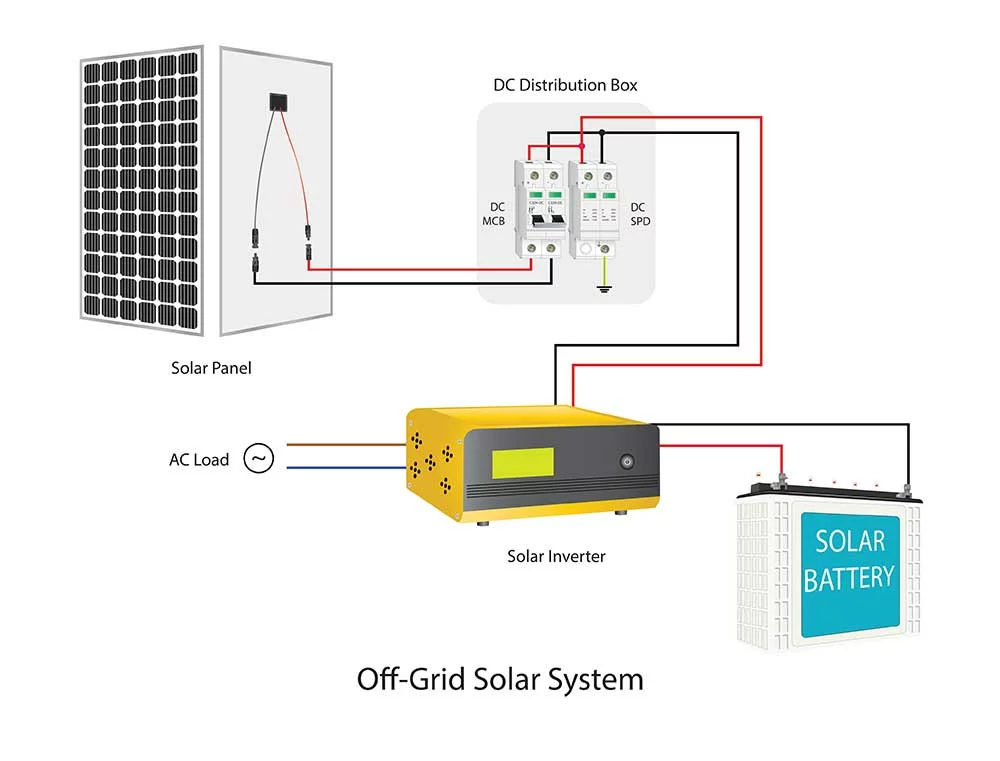
An off-grid solar system
On the other hand, home appliances run on alternating current (AC). So the two are incompatible. An off-grid inverter converts DC to AC to make them compatible.
Features To Look for in an Off-Grid Inverter
Consider the following features before buying an off-grid inverter.
Power Output
An inverter’s power output is a critical feature because it determines the amount of current you will get to power your appliances.
With the output given in watts (or kW), typical inverter sizes range from around 1,300 watts (1.3kW) to 12,000 watts (12kW).
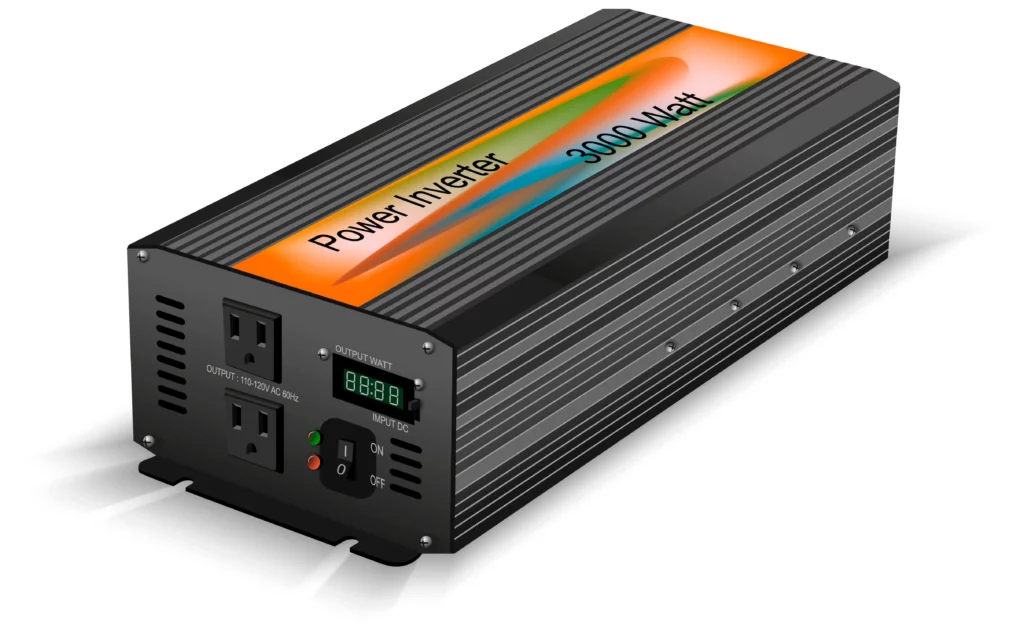
A 3000-watt power inverter
Tiny off-grid cabins can run on 1-3.5kW inverter systems, while off-grid houses with single air-conditioning units require at least a 5kW system.
Large homes with all the typical appliances, including an AC, need at least a 10kW solar power inverter.
Battery Voltage
The battery voltage is the inverter’s input, and the nominal battery bank voltages are 12V, 24V, and 48V. An off-grid system inverter’s voltage input should match the battery storage voltage.
And the higher the voltage, the more power the inverter can output.
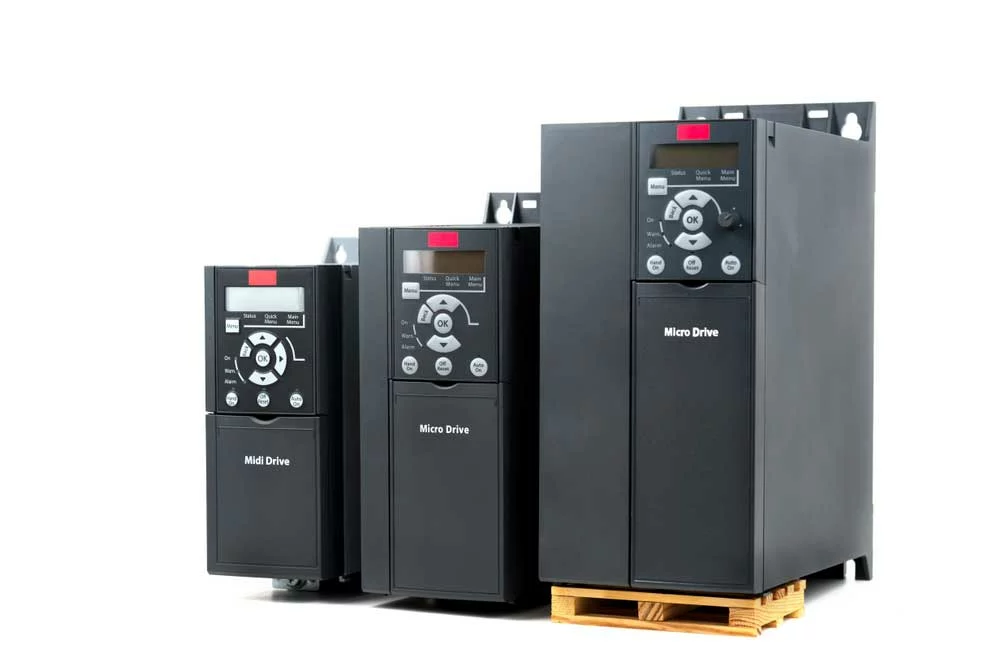
Three differently-sized inverters with varying capacities
For instance, 12V inverters can only produce about 1.5-2.5kW maximum, while their 24V counterparts can reach 3.5kW. 48V off-grid power inverters can go up to 7kW.
Advanced batteries or power walls can have voltage ratings of up to 400V, which is more than the required output voltage (120V).
Such off-grid systems can run multiple appliances simultaneously when paired with powerful inverters.
Type of Inverter
There are three types of inverters based on the AC output.
These are square waves, modified sine waves, and pure sine wave inverters. Square wave and modified sine waveform inverters can work if you have small appliances like bulbs that do not require refined AC.
However, they can damage devices such as TVs, washing machines, microwaves, compressors, and fridges.
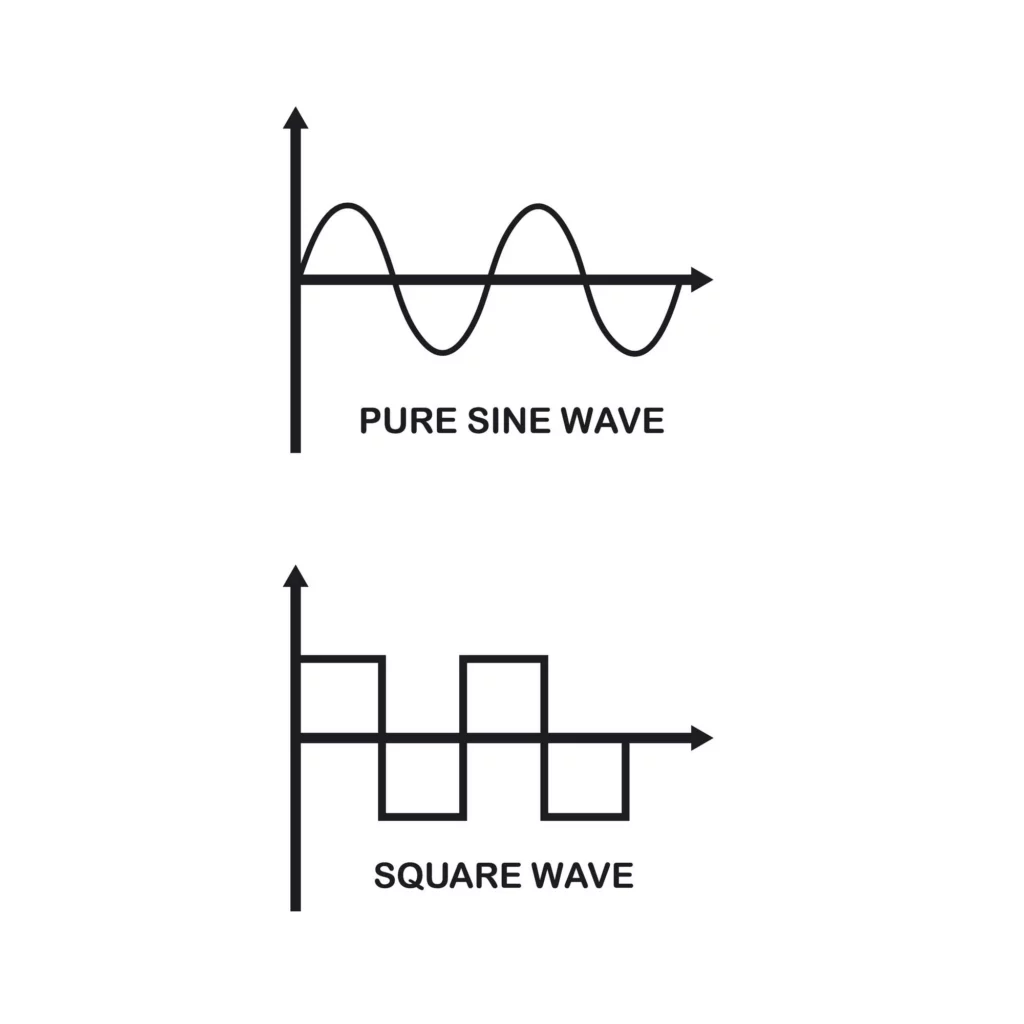
A pure sine wave vs. a square wave
PSW (Pure Sine Wave) units are the highest quality inverters and the most reliable choice because they produce refined AC waveforms.
This continuous power output is as close as you can get to grid AC power or a backup generator. So you can confidently use this type of inverter without worrying about damaging any household appliance.
Efficiency
Inverters experience some losses in the conversion of DC to AC. So the inverter efficiency cannot be 100%. Consider getting a pure sine wave inverter with an efficiency rating closest to 100.
Monitoring and Programming
Economical inverters usually have regular monitoring and programming features. However, advanced off-grid and hybrid inverters contain powerful monitoring features, such as remote control/programming, a battery monitor, a remote switch, etc.
The remote system option is particularly advantageous because it gives you control over the power system from handheld devices or laptops.
Solar Charge Controller Specifications
Multi-mode inverters, such as the hybrid type or all-in-one systems, combine several functions in one. If you buy a system with a solar charge controller, you need to consider this component’s features.
First, check its maximum PV input power, which should match the solar array power rating. And the device should monitor the solar energy flowing in from the entire solar installation.
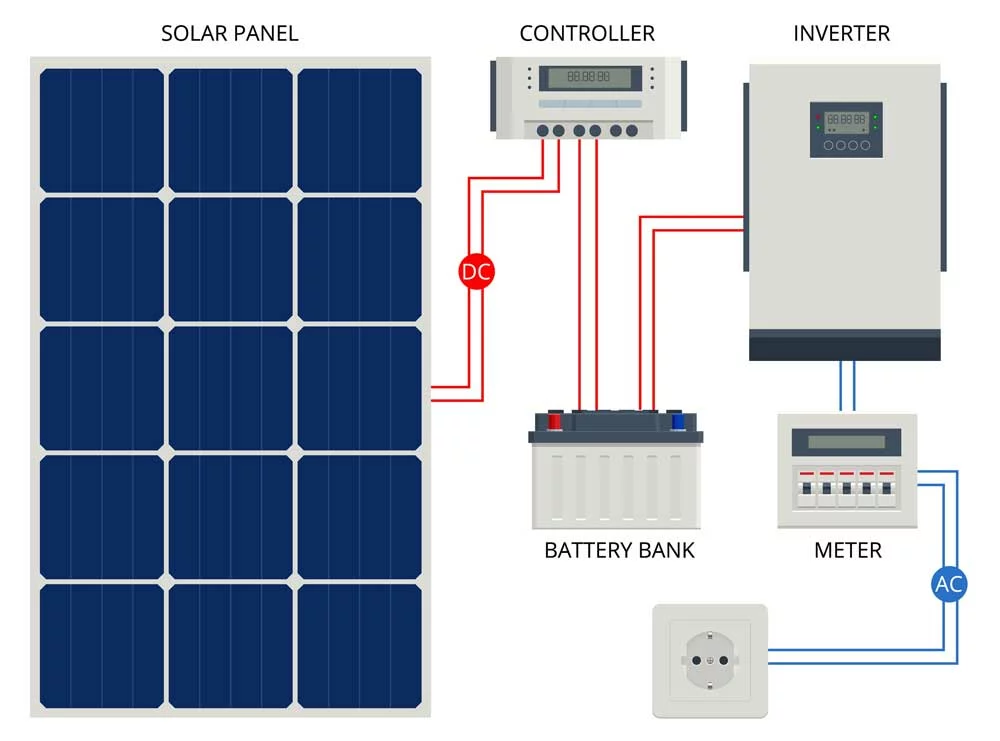
An inverter controller and a charge controller as different units
Another vital factor is the solar charge controller efficiency, which should be at least 90%.
Keep in mind lead-acid battery banks require precise battery charging parameters. So the battery charger component in the inverter should have a setting for each solar battery type.
Warranty Period
A reliable off-grid system should function without any hiccups for several years. But in case of anything, a warranty should safeguard your investment.
Some solar inverter manufacturers offer 10-year warranty options, while others go up to 25.
The latter is better because it matches other off-grid solar power system equipment, such as solar panels.
Best Off-Grid Inverters
Considering the factors above, these are the best off-grid solar inverters.
WZRELB-250012 Off-Grid Inverter
This off-grid inverter gives you a reliable AC backup power source because it features high-quality, true copper inductance to filter the waveform to produce output voltage with a pure sine wave.
Additionally, it features a thick 2.0mm PCB that allows a stronger current to float in the circuit.
This design increases the load capacity, producing 2,500 watts of continuous power and a peak surge power rating of 5,000 watts.

A camper trailer with a solar panel and an air-conditioning unit
The device also has a battery monitor that sounds an alarm when the solar battery voltage is low (9.5-10V) and shuts down in the 9-10V range. Overvoltages can damage the inverter, so it shuts down at 15.5V for safety.
Magnum Energy MS-PAE MS4448PAE
Magnum Energy’s pure sine wave inverter features extra ports that include an RS485 interface for network expansion to enable remote system options.
The device can handle a wide range of input battery voltage (36-64V), resulting in a high power output of 4,400 watts.
Surge power spikes caused by motors, compressors, and other devices can get enough power from this unit because its surge rating is 8,500 watts.

A solar inverter
With the inverter-split phase operation, this unit can provide 120V for typical appliances in North America and 240V for air-conditioning units.
Best Off Grid Solar Inverters:
Solinba LSW8
The LSW8 is a battery inverter-charger that can pump power into eight different battery types to optimize the charging process. And it features an intelligent 3-step battery charging, constant charge, and float system.
A UPS function makes the unit a hybrid unit because it can transition from AC to the battery storage system in less than 13ms when the grid power goes off.
And it can switch back to AC in less than 7ms when the utility power gets restored.
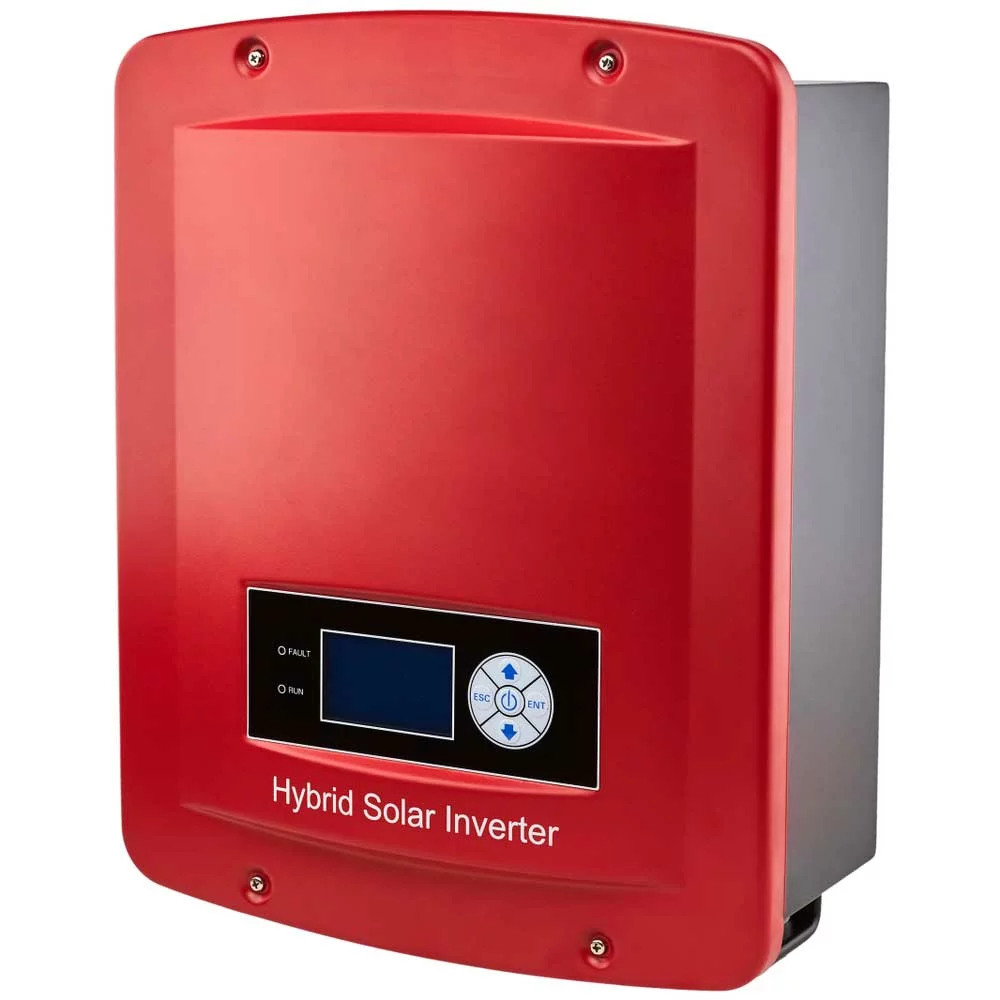
A hybrid solar inverter
Two pairs of full M8 copper pillar terminals enable the pure sine wave inverter to run large amperes.
Additionally, it has a surge power output rating of 12,000 watts for 15-20 seconds. So you can use the LSW8 for off-grid residential and commercial installations.
Best Off-Grid Solar Inverters:
Victron Energy EasySolar 12/600
Victron is known for its sophisticated range of inverter/charger options, and this unit combines an MPPT charge controller, inverter, battery charger, and AC distribution in a single box.
So it acts as a central inverter because it simplifies solar installation. You only have to connect it to the solar panels, load, and batteries.
Multiple software programs exist to configure the multi-mode inverter for full off-grid capability or as a grid-tie inverter.
Although this Victron Energy inverter is not cheap, it might give you value for money, considering you won’t have to buy a charge controller. Therefore, it is an excellent choice if you want a cost-effective, all-in-one system.
Best Off-Grid Solar Inverters:
Renogy Pure Sine Wave Inverter
Renogy’s inverter is one of the best low-cost options for DC to AC conversion in your RV or truck when camping.

A motor home with an off-grid solar system
It is not a split dual AC source, but the unit produces 120V pure sine wave AC with a conversion efficiency greater than 90%. And it has several safety features to maximize durability and circuit protection.
Wrap Up
In conclusion, creating a reliable off-grid system can be tricky if you don’t have the most suitable inverter.
But the units listed above have impressive features for off-grid solar power systems, and you should consider them for your project.
If you need further advice or have any questions, reach out, and we’ll be happy to help.
